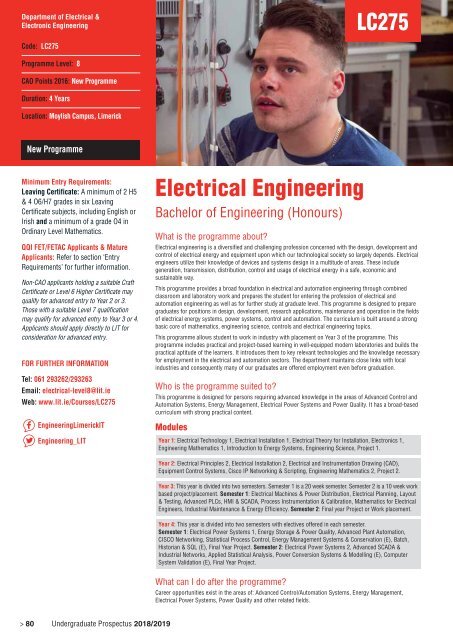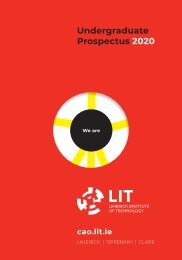LIT_fulltime2017
Create successful ePaper yourself
Turn your PDF publications into a flip-book with our unique Google optimized e-Paper software.
Department of Electrical &<br />
Electronic Engineering<br />
LC275<br />
Code: LC275<br />
Programme Level: 8<br />
CAO Points 2016: New Programme<br />
Duration: 4 Years<br />
Location: Moylish Campus, Limerick<br />
New Programme<br />
Minimum Entry Requirements:<br />
Leaving Certificate: A minimum of 2 H5<br />
& 4 O6/H7 grades in six Leaving<br />
Certificate subjects, including English or<br />
Irish and a minimum of a grade O4 in<br />
Ordinary Level Mathematics.<br />
QQI FET/FETAC Applicants & Mature<br />
Applicants: Refer to section ‘Entry<br />
Requirements’ for further information.<br />
Non-CAO applicants holding a suitable Craft<br />
Certificate or Level 6 Higher Certificate may<br />
qualify for advanced entry to Year 2 or 3.<br />
Those with a suitable Level 7 qualification<br />
may qualify for advanced entry to Year 3 or 4.<br />
Applicants should apply directly to <strong>LIT</strong> for<br />
consideration for advanced entry.<br />
FOR FURTHER INFORMATION<br />
Tel: 061 293262/293263<br />
Email: electrical-level8@lit.ie<br />
Web: www.lit.ie/Courses/LC275<br />
EngineeringLimerickIT<br />
Engineering_<strong>LIT</strong><br />
Electrical Engineering<br />
Bachelor of Engineering (Honours)<br />
What is the programme about?<br />
Electrical engineering is a diversified and challenging profession concerned with the design, development and<br />
control of electrical energy and equipment upon which our technological society so largely depends. Electrical<br />
engineers utilize their knowledge of devices and systems design in a multitude of areas. These include<br />
generation, transmission, distribution, control and usage of electrical energy in a safe, economic and<br />
sustainable way.<br />
This programme provides a broad foundation in electrical and automation engineering through combined<br />
classroom and laboratory work and prepares the student for entering the profession of electrical and<br />
automation engineering as well as for further study at graduate level. This programme is designed to prepare<br />
graduates for positions in design, development, research applications, maintenance and operation in the fields<br />
of electrical energy systems, power systems, control and automation. The curriculum is built around a strong<br />
basic core of mathematics, engineering science, controls and electrical engineering topics.<br />
This programme allows student to work in industry with placement on Year 3 of the programme. This<br />
programme includes practical and project-based learning in well-equipped modern laboratories and builds the<br />
practical aptitude of the learners. It introduces them to key relevant technologies and the knowledge necessary<br />
for employment in the electrical and automation sectors. The department maintains close links with local<br />
industries and consequently many of our graduates are offered employment even before graduation.<br />
Who is the programme suited to?<br />
This programme is designed for persons requiring advanced knowledge in the areas of Advanced Control and<br />
Automation Systems, Energy Management, Electrical Power Systems and Power Quality. It has a broad-based<br />
curriculum with strong practical content.<br />
Modules<br />
Year 1: Electrical Technology 1, Electrical Installation 1, Electrical Theory for Installation, Electronics 1,<br />
Engineering Mathematics 1, Introduction to Energy Systems, Engineering Science, Project 1.<br />
Year 2: Electrical Principles 2, Electrical Installation 2, Electrical and Instrumentation Drawing (CAD),<br />
Equipment Control Systems, Cisco IP Networking & Scripting, Engineering Mathematics 2, Project 2.<br />
Year 3: This year is divided into two semesters. Semester 1 is a 20 week semester. Semester 2 is a 10 week work<br />
based project/placement. Semester 1: Electrical Machines & Power Distribution, Electrical Planning, Layout<br />
& Testing, Advanced PLCs, HMI & SCADA, Process Instrumentation & Calibration, Mathematics for Electrical<br />
Engineers, Industrial Maintenance & Energy Efficiency. Semester 2: Final year Project or Work placement.<br />
Year 4: This year is divided into two semesters with electives offered in each semester.<br />
Semester 1: Electrical Power Systems 1, Energy Storage & Power Quality, Advanced Plant Automation,<br />
CISCO Networking, Statistical Process Control, Energy Management Systems & Conservation (E), Batch,<br />
Historian & SQL (E), Final Year Project. Semester 2: Electrical Power Systems 2, Advanced SCADA &<br />
Industrial Networks, Applied Statistical Analysis, Power Conversion Systems & Modelling (E), Computer<br />
System Validation (E), Final Year Project.<br />
What can I do after the programme?<br />
Career opportunities exist in the areas of: Advanced Control/Automation Systems, Energy Management,<br />
Electrical Power Systems, Power Quality and other related fields.<br />
> 80<br />
Undergraduate Prospectus 2018/2019









